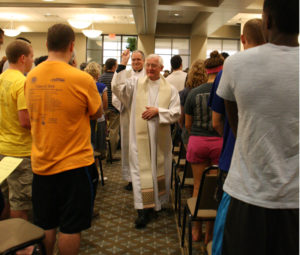By Anne Marie Amacher
The Catholic Messenger
DAVENPORT — Faculty and staff applauded as students new to St. Ambrose University entered the Rogalski Center ballroom Aug. 19. The students were attending the blessing of the new school year and convocation.
Sister Joan Lescinski, CSJ, jumped out of her place in line to help direct students in the ballroom to their seats. She then welcomed the Class of 2018 to its new home for the next four years.

Bishop Martin Amos sprinkles holy water on new students at St. Ambrose University in Davenport. The blessing was part of the annual convocation, which was held Aug. 19.
Micah Kiel, associate professor and department chair for the theology department, gave the convocation talk. “This summer I read a book by Lawrence Krauss, one of the world’s leading physicists, called: ‘A universe from nothing. Why there is something rather than nothing.’ Being a theologian myself, someone who is interested in questions about God, meaning and truth, I was quite curious to delve into this book about physics and get an answer to such a foundational question.”
He found the book fascinating but also “mind-boggling” in its picture of the earliest moments of the universe. After reading the book, he decided it never answered the question: “Why is there something rather than nothing?” Kiel noted that part way through the book, Krauss admits as much, saying that the book should really be titled “How there is something from nothing.”
“This is false advertising,” Kiel said. “It’s like calling a Justin Bieber song ‘good’ or saying that Facebook has ‘privacy’ settings.” The students laughed.
Kiel said today we often find ourselves caught between the how and why.
“I’m going to flip on my professor switch right now and teach a big word you may not have heard before: epistemology.” Promising not to explain its meaning in the Greek language, he said epistemology refers to the study of how we know what we know. Two different ways of knowing are involved.
The first is scientific. The scientific method has increasingly dominated the worldview over the last few centuries. This is a good thing, he said. “We cherish the advances in medicine, science and technology. Our understanding of the natural world has expanded profoundly through the revelation of evolution, through experiments regarding the smallest particles, and new understandings of distances measured in light years. I am not a scientist, but I think I’m right in saying that science is about observation, experimentation and measurement, all with the laudable goal of formulating, testing and modifying a hypothesis.”
The second way of knowing is essentially experiential. It’s about what is in your gut or your heart, not what’s in your head. How do you know that you love someone or that someone loves you? Love, as experienced, is not susceptible to scientific experiment. Science can’t explain why something is beautiful, why it moves us. How it provides meaning and structure to our lives.
“So, you may not have thought about it this way before, but these are the two dominant, and potentially contradictory, ways we tend to view the world today.”
Kiel told the students, “An education at St. Ambrose, whether you like it or not, places you right in between these two ways of knowing. You are going to learn the scientific method; you might take statistics, math, biology, accounting. These are scientific essentials. We don’t want people doing biology in Lewis Hall the same way they interpret an aria across the parking lot in Galvin. But, having said that, the thing that makes St. Ambrose unique, the thing that can make you different from most other people when you graduate — in four or five or six years, is the ability to bridge these gaps.”
At St. Ambrose, students will discuss both how and why, he noted. The best students don’t compartmentalize those questions, but find creative ways to have them mutually inform one another.
“We, the faculty and staff at St. Ambrose, will help you with this. But we can only do so much. The real job is left to you: to think, to reflect, to ask, to try, to be bold, to discuss. Different ways of knowing the world are not mutually exclusive. One is not right and the other wrong. They are different, but both are essential.”
In closing, he said, “Take your well-disciplined strengths and stretch them between two opposing poles. Because inside human beings is where God learns.”
Bishop Martin Amos blessed the students, praying, “Lord our God, in your wisdom and love you surround us with the mysteries of the universe. In times long past you sent us your prophets to teach your laws and to bear witness to your undying love. You sent your Son to teach us by word and example that true wisdom comes from you alone. Send your Spirit upon these students and their teachers — and all who serve St. Ambrose University — and fill them with your wisdom and blessings. Grant that during this academic year they may devote themselves to their studies and share what they have learned with others. Grant this through Christ our Lord.”
In her charge to students, Sr. Lescinski said that she, the faculty and staff are “committed to the unending search for truth and commitment to social justice and service that defines us as truly Ambrosian. I challenge all of us to engage in that search and to keep in mind our brothers and sisters throughout the world who thirst after peace and justice.”
She noted that controversies will emerge, but those should be addressed through an honest exchange of ideas in a manner that is “respectful and civil toward all.”
Sr. Lescinski closed with, “As we begin this new academic year, let me charge all member of the St. Ambrose University community to promote and support learning and academic freedom, and to do so with integrity, intellectual curiosity, Christian charity and a spirit of service to others.”








